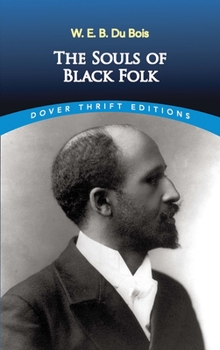The Souls of Black Folk (Dover Thrift Editions)
Select Format
Select Condition 
Book Overview
This landmark book is a founding work in the literature of black protest. W. E. B. Du Bois (1868-1963) played a key role in developing the strategy and program that dominated early 20th-century black protest in America. In this collection of essays, first published together in 1903, he eloquently affirms that it is beneath the dignity of a human being to beg for those rights that belong inherently to all mankind. He also charges that the strategy of accommodation to white supremacy advanced by Booker T. Washington, then the most influential black leader in America, would only serve to perpetuate black oppression. Publication of The Souls of Black Folk was a dramatic event that helped to polarize black leaders into two groups: the more conservative followers of Washington and the more radical supporters of aggressive protest. Its influence cannot be overstated. It is essential reading for everyone interested in African-American history and the struggle for civil rights in America.
Format:Paperback
Language:English
ISBN:0486280411
ISBN13:9780486280417
Release Date:July 2016
Publisher:Dover Publications
Length:176 Pages
Weight:0.33 lbs.
Dimensions:0.6" x 5.4" x 8.4"
Age Range:14 years and up
Grade Range:Grade 9 and higher
Customer Reviews
2 ratings
Activist, Spiritual, Educational, Anthropological, and Poetic American Masterpiece
Published by Thriftbooks.com User , 15 years ago
This work, written in the first decade of the twentieth century, is activist, spiritual, educational (on the history of African American life from the time of its publication back to the Civil War), anthropological, and poetic. "The Souls of Black Folk" should be in anthropological curriculums throughout the country, right alongside Margaret Mead's "Coming of Age in Samoa." For me, it showed, firstly, how slowly progress in the quality of life for African Americans had been since the Emancipation Proclamation up to 1903, and then, how slowly it has been in coming since the publication of this book to the present. We still have today a racial inequity on a scale that I, personally, am guessing will seem as barbaric in 100 years, just as the Jim Crow laws of the past seem barbaric to us now. DuBois was the first African American to receive a Ph.D. from Harvard and is credited as being one of the two leaders of the Harlem Renaissaince, Alain Locke being the other. I think this is one of the most important books on American culture that I know of, as well as an excellent document on the details of African American life, particularly in the years preceeding the works' completion.
The Black Emerson
Published by Thriftbooks.com User , 24 years ago
If you are unaquainted with this book or with this author, you should remedy the situation immediately. In terms of eloquence, clear and ringing prose, descriptive power and any other quality that seperates great writers from mediocre ones, Dubois stands in the first rank. If Afro-Americans had had access to this book on a mass scale, there would have been a third real revolution in this country (I include the Civil War, obviously). This is the voice of suffering, but also of great ideas and ironclad arguement. It is also an incitement and very much an indictment, against racial boundaries that have plagued this nation since its inception. Dubois was and is one of the most powerful voices this country has ever produced. My jaw dropped on numerous occasions when first reading this text. He conveyed better than any other author, and there have been many great ones (Baldwin, Morrison, Wright, etc.) what it means to be "seperate, but equal." He is never an apologist. He at all moments maintains the dignity of his race. I really prefer in all aspects his demaeanor to Marcus Garvey's, even though that author was a more prominent "player." For modern revisionists (like Jane Smiley)who think that "Uncle Tom's Cabin" was "great literature," I would recommend that they read this text and then decide. One voice is authentic, the other sorely disingenuous, and even, historically, counter-productive.
The Souls of Black Folk Mentions in Our Blog

Celebrating Black History Month: 14 Black Scientists Who Changed the World
Published by Beth Clark • February 20, 2019
Black history IS history, and Black History Month is a time to celebrate both contemporary and traditional black history, beginning with a nod to Dr. Carter G. Woodson, the scholar who established what we now celebrate in an effort to collect, document, and backfill all of the history that was missing because it never made it into the books. Below are 14 scientists, mathematicians, and engineers who have made significant contributions to furthering the human race for people of all color.






